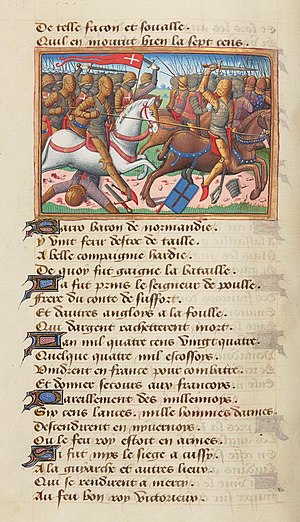Battle of Verneuil
| Battle of Verneuil | |||||||
|---|---|---|---|---|---|---|---|
| Part of the Hundred Years' War | |||||||
 Battle of Verneuil |
|||||||
|
|||||||
| Belligerents | |||||||
|
|
|
||||||
| Commanders and leaders | |||||||
|
|
|
||||||
| Strength | |||||||
| 8,000-10,000 | 14,000-16,000 | ||||||
| Casualties and losses | |||||||
| 1600 | 6000 - 10,000 | ||||||
The Battle of Verneuil was a strategically important battle of the Hundred Years' War, fought on 17 August 1424 near Verneuil in Normandy and a significant English victory. It was a particularly bloody battle, described by the English as a second Agincourt. Altogether some 7262 French and allied troops were killed, including 4000 Scots. English losses were 1600, including two men-at-arms and "a very few archers". The Scots army, led by Archibald, Earl of Douglas and John Stewart, Earl of Buchan (both of whom were killed), was almost destroyed. Many French noblemen were taken prisoner; among them the Duke of Alençon, Pierre, the bastard of Alençon, and Marshal de La Fayette. After Verneuil, the English were able to consolidate their position in Normandy. The Army of Scotland as a distinct unit ceased to play a significant part in the Hundred Years' War, although many Scots continued to serve in France.
Because of the 1420 Treaty of Troyes which had disinherited him, upon the death of his father Charles VI on 21 October 1422, the Dauphin Charles was recognised as Charles VII, King of France, only in the south of the country (less the province of Guyenne in the southwest). Charles' coronation in Reims would not take place before 17 July 1429, seven years after the death of his father.
The death of Henry V in August 1422, two months before that of Charles VI, brought no relief, as the continuing English war effort was effectively managed by John, Duke of Bedford, acting for the three-year-old Henry VI.
...
Wikipedia
